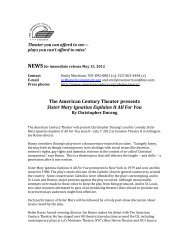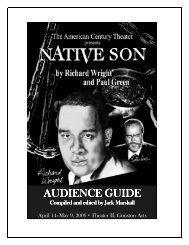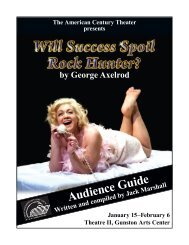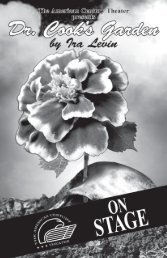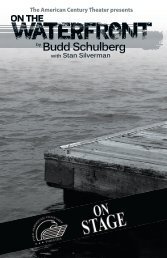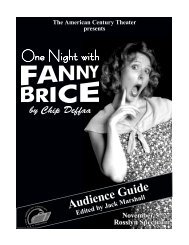Stage Door - The American Century Theater
Stage Door - The American Century Theater
Stage Door - The American Century Theater
Create successful ePaper yourself
Turn your PDF publications into a flip-book with our unique Google optimized e-Paper software.
Hollywood fame, was a rebuke to all the serious playwrights who yielded to<br />
the studios’ siren songs, including Kaufman himself. <strong>The</strong>re were a lot of<br />
them: Ben Hecht, Charles MacArthur, Bartlett Cormack, Charles Lederer,<br />
Sidney Howard, Preston Sturges, Robert E. Sherwood, and Clifford Odets,<br />
to name just a few. <strong>The</strong> trend continued and even accelerated in the Forties<br />
and beyond.<br />
<strong>The</strong>re were those who held out against the magnet of Hollywood, of<br />
course—some because they, like Terry, the heroine of <strong>Stage</strong> <strong>Door</strong>, were<br />
passionately devoted to the stage; others, like Helen Hayes, Tallulah<br />
Bankhead, Fanny Brice, and Katharine Cornell, because their stage presence<br />
did not translate onto the silver screen, for whatever reason. Others,<br />
especially among the writing ranks, tried Hollywood and failed, or, like<br />
Kaufman, couldn’t stomach it. <strong>The</strong> bleeding there, though, continued as<br />
well.<br />
Shortly after <strong>Stage</strong> <strong>Door</strong> opened, the man who was infusing new excitement<br />
into Broadway, the mercurial (pun intended . . . sorry) Orson Welles, actor,<br />
director, designer, under 30 years old and a bona fide genius, left New York<br />
for Hollywood, too. He was Broadway’s best hope of fighting back, but<br />
Broadway was too small for him.<br />
Flash forward to 2011, and the trends that Kaufman recoiled at in 1936 have<br />
all borne predictable, if devastating, results. <strong>The</strong> stage’s most promising<br />
playwrights now usually get in one or two Broadway hits and, like Paddy<br />
Chayefsky, Aaron Sorkin, and David Mamet, head to television or movies.<br />
More often than not, young writers skip writing plays at all. A tiny<br />
percentage of the number of dramas that were produced in 1936 makes it to<br />
Broadway in a typical season now, and a small fraction of those succeed.<br />
Broadway isn’t where the jobs are, or the money, or the fame, or the<br />
prestige, and in this age of Spiderman the Musical, not the art either. In<br />
<strong>Stage</strong> <strong>Door</strong>, much is made of the fact that movie actors can’t carry a play:<br />
today, movie or TV actors are about the only actors who can sell tickets to a<br />
play, even the movie and TV actors who aren’t very good.<br />
I don’t think George saw that one coming.<br />
But as for the rest, <strong>Stage</strong> <strong>Door</strong> proves that he was able to see the writing on<br />
the wall. <strong>The</strong>ater was still riding high in 1936, but the fall was within view.<br />
As for Hollywood, it triumphed over George S. Kaufman’s protests as it has<br />
5





